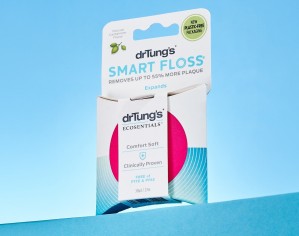Your cart
There are no more items in your cart
Is Flossing Effective?
[caption id="attachment_130" align="aligncenter" width="550"] Is flossing effective? If you do so correctly![/caption] A new body of research has emerged recently questioning the importance of flossing as compared to other forms of oral healthcare to remove bacteria from the mouth. The Journal of Clinical Periodontology concluded in a recent study that "despite being widely advocated, it is noteworthy that the majority of available studies fail to demonstrate that flossing is generally effective in plaque removal and in reducing gingival (gum) inflammation." So, is flossing effective? While the evidence that has presented itself comes from a reputable source, it's safe to say that the jury is still out on this one. Asking the question "is flossing effective" is just like asking if brushing your teeth is effective - are you doing it correctly? If you are only brushing your teeth, then you are only cleaning 60% of your teeth. The action of flossing is effective in covering that remaining 40% in hard-to-reach places where plaque and food debris builds up, leading potentially to other larger issues, such as gum disease. We asked some of our favorite members of the dental community at large what their thoughts are on the matter:
Is flossing effective? If you do so correctly![/caption] A new body of research has emerged recently questioning the importance of flossing as compared to other forms of oral healthcare to remove bacteria from the mouth. The Journal of Clinical Periodontology concluded in a recent study that "despite being widely advocated, it is noteworthy that the majority of available studies fail to demonstrate that flossing is generally effective in plaque removal and in reducing gingival (gum) inflammation." So, is flossing effective? While the evidence that has presented itself comes from a reputable source, it's safe to say that the jury is still out on this one. Asking the question "is flossing effective" is just like asking if brushing your teeth is effective - are you doing it correctly? If you are only brushing your teeth, then you are only cleaning 60% of your teeth. The action of flossing is effective in covering that remaining 40% in hard-to-reach places where plaque and food debris builds up, leading potentially to other larger issues, such as gum disease. We asked some of our favorite members of the dental community at large what their thoughts are on the matter:

 Is flossing effective? If you do so correctly![/caption] A new body of research has emerged recently questioning the importance of flossing as compared to other forms of oral healthcare to remove bacteria from the mouth. The Journal of Clinical Periodontology concluded in a recent study that "despite being widely advocated, it is noteworthy that the majority of available studies fail to demonstrate that flossing is generally effective in plaque removal and in reducing gingival (gum) inflammation." So, is flossing effective? While the evidence that has presented itself comes from a reputable source, it's safe to say that the jury is still out on this one. Asking the question "is flossing effective" is just like asking if brushing your teeth is effective - are you doing it correctly? If you are only brushing your teeth, then you are only cleaning 60% of your teeth. The action of flossing is effective in covering that remaining 40% in hard-to-reach places where plaque and food debris builds up, leading potentially to other larger issues, such as gum disease. We asked some of our favorite members of the dental community at large what their thoughts are on the matter:
Is flossing effective? If you do so correctly![/caption] A new body of research has emerged recently questioning the importance of flossing as compared to other forms of oral healthcare to remove bacteria from the mouth. The Journal of Clinical Periodontology concluded in a recent study that "despite being widely advocated, it is noteworthy that the majority of available studies fail to demonstrate that flossing is generally effective in plaque removal and in reducing gingival (gum) inflammation." So, is flossing effective? While the evidence that has presented itself comes from a reputable source, it's safe to say that the jury is still out on this one. Asking the question "is flossing effective" is just like asking if brushing your teeth is effective - are you doing it correctly? If you are only brushing your teeth, then you are only cleaning 60% of your teeth. The action of flossing is effective in covering that remaining 40% in hard-to-reach places where plaque and food debris builds up, leading potentially to other larger issues, such as gum disease. We asked some of our favorite members of the dental community at large what their thoughts are on the matter:
What they're saying is that flossing may be good for removing food from between teeth, but is not successful in removing biofilm — and this is true, but it's nothing novel, and it's not the point. Flossing isn't removing plaque, it's disorganizing it. By disorganizing bacteria in the mouth, you prevent it from forming biofilm and getting a hold in your mouth to cause tooth decay." – Dr. Mark Burhenne, DDS, bestselling author and creator of AsktheDentist.com Integrative cardiologist Dr. Stephen Sinatra authored an article titled "A Mouth-Heart Connection" in 2010 that describes the powerful relationship between the health of the heart and the gums:Over the past two decades, various researchers have demonstrated that cardiovascular risks increase in tandem with the severity of gum infections. According to Thomas E. Rams, DDS, MHS, expert and author on the microbiology of gum disease, people [who are] otherwise in good health who develop serious periodontal disease double their risk of fatal heart attack and triple their risk of stroke. Since estimated 54 million people have had some form of periodontal disease, it's no wonder cardiovascular disease is the number-one killer in the United States. Consider flossing part of a Heart Healthy lifestyle. – Excerpt from Holistic Dental Care: The Complete Guide to Healthy Teeth and Gums, by Nadine Artemis of Living Libations & Dr. Tung's Smile Ambassador
The real issue with flossing is that people do not like flossing, and if they can get out of it, they are happy to. For some people, it's a push to even get them to brush regularly, let alone floss! Brushing is great, but it is not enough if you want a super clean, fresh and healthy mouth. Flossing must be incorporated into the natural dental protocol. This is my experience after washing out tens of thousands of mouths with natural and organic oral products since 2003." – Gabriala Brown, Founder of Tooth Soap® and Marvelous Tooth Care™, Dr. Tung's Smile Ambassador

Claiming that flossing is not important is a profound dis-service to the general public. Any given individual's susceptibility to periodontitis (bone loss) and/or cavities is genetically determined - so the "NEED" to floss varies from person to person regarding these disease entities. BUT, almost everyone is susceptible (to a greater or lesser degree) to Gingivitis - inflammation of the gums that does not spread in to the bone - and any inflammation can have systemic implications. At a minimum, it can cause bleeding gums AND BAD BREATH!!!!! Critics of flossing need to get serious. There are "alternatives" to flossing - for example, removing bacteria from in between the teeth with thin toothpicks, a proxabrush or any number of aids. But it is challenging to do this well from the inside so these are better utilized as adjuncts to flossing as opposed to replacing it. Waterpiks are beneficial as well but are the least effective approach and should only be viewed as an adjunct. Removing bacteria from in between your teeth in some manner is one of the most straight forward preventive measures one can take to facilitate oral & systemic health. For most people, flossing is the most effective technique to accomplish this. In summary, don't question it, just do it!" – Dr. Braden Seamons, D.D.S., Board Certified Diplomate of the American Board of Periodontology




By Dentist Midtown 01/24/2019 01:51:46
Hey, This is exactly what i was looking for. Thank you for sharing. It will be really helpful for me :)
By To floss or not to floss… – healthview 08/7/2016 17:48:30
[…] Basically, what AP is saying is not wrong – there is “weak evidence.” However, the article is written in a way that could be interpreted that there is existing, high quality research that shows the effectiveness of flossing is limited or weak. AP has chosen an alarming headline of “Medical benefits of dental floss unproven.” However, a more appropriate heading could be “Research into the benefits of flossing is not high quality.”Source: http://drtungs.com/blog/?p=128 […]
By Ashley McClelland 01/22/2016 22:27:24
Hi James! Thanks so much for reaching out. Here are a few things to keep in mind about flossing: 1. We floss to remove plaque. 2. Many people who have had issues using floss, find Smart Floss is easier and more effective in removing plaque than other flosses. We would be happy to send you a sample to try. 3. According to Dr. Braden Seamon’s quote, there are “alternatives” to flossing – for example, removing bacteria from in between the teeth with thin toothpicks, a proxabrush or any number of aids. But it is challenging to do this well from the inside so these are better utilized as adjuncts to flossing as opposed to replacing it. Waterpiks are beneficial as well but are the least effective approach and should only be viewed as an adjunct. (Note that he didn’t mention mouthwash.) 4. Most mouthwashes indiscriminately kill good and bad bacteria thus imbalancing the oral microbiome. And killing bacteria is not the same as removing or disorganizing plaque. Please let us know if you have any further questions, and thanks again! :)
By James Bergman 01/22/2016 16:15:22
I know that flossing is important for keeping my teeth healthy. I have heard it ever since my first dentist appointment, but I have always struggled to do it, even if it does clean the other 40% of my teeth. Is it OK to substitute flossing with things like mouthwash?